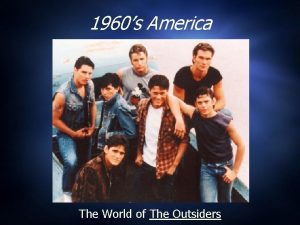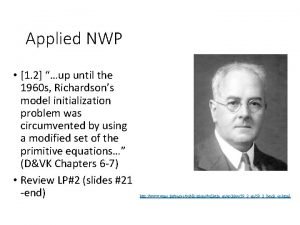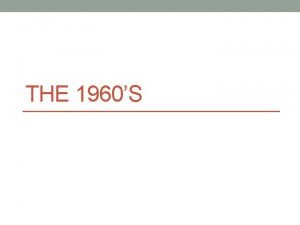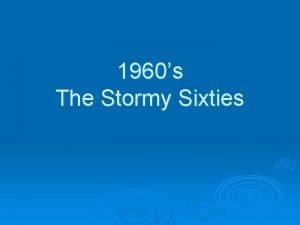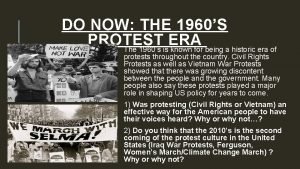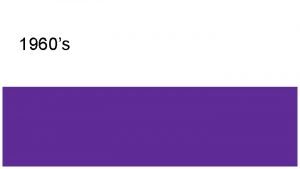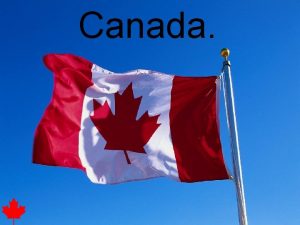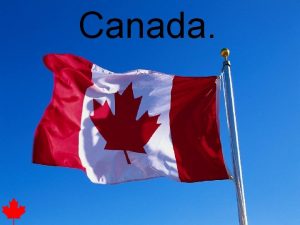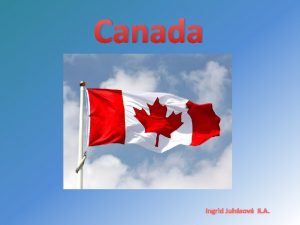Canada in the 1960s The 1960s was a

















- Slides: 17

Canada in the 1960’s The 1960’s was a decade of concentrated social change. Social movements of the 1960’s included: Women’s liberation Civil rights Free love Peace All of these movements shared a desire for the liberation of the individual. They created a counterculture of youth and freedom, that questioned the “status quo” of the “establishment”




Canada in the 1960’s In the early 60’s Canada produced the world’s leading philosopher of communications Marshal Mc. Luhan. He observed that electronic media was becoming more important than print. He was made famous by the phrase “ The medium is the message. ” and said that the new types of media would ultimately create a “global village. ” He theorized that distinctive national identities would dissolve as the distances created by geography, succumbing to the instant communication provided by new technology. The 1960’s certainly marked huge changes in the ways in which Canadian’s perceived themselves. We obtained a new national symbol, we instated the official languages Act and we experienced a huge shift in our national morality


Canada in the 1960’s: The new Flag In 1964 Canadians were involved in an argument over the Canadian flag, many were attached to the British Union Flag However people who viewed themselves as Canadian, and not British, did not care for it. In 1963 Prime Minister Lester Pearson unveiled his idea for a new flag and by 1965, we had a brand new flag


Show clip

Canada in the 1960’s: Freedom of the individual In the early and mid-60’s, the desire for freedom was expressed in long hair, casual dress, and loud rock and roll (Hippie Era) The decade progressed into protest marches on behalf of peace, and the civil rights movement The new philosophy set individuals above the authority of groups and what by many were considered outdated moral standards Government was seen by many as the accomplice of business, instead of the protector of citizens and the environment



Canada in the 1960’s: Women were ready for liberation A dependable birth control pill, introduced in the early 1960’s made it possible for women to delay or avoid having children. This in turn made it possible for more women to compete with men in the business world. Women’s groups campaigned for equal rights, equal opportunities in the job market and an end to discrimination based on sex. Prime Minister Pearson set up of Royal Commission on the status of women, that was actually led by a woman, the first federal commission ever to be chaired by a woman.


Canada in the 1960’s: Bilingualism In 1963 Prime Minister Pearson appointed the Royal Commission on Bilingualism and Biculturalism. The report found that Quebecois were alienated from the rest of Canada, partially because the French language was not considered equal to English throughout the country. When Pierre Trudeau Became Prime Minister in 1968, he passed the Official Languages Act in 1969, this gave equal status to English and French officially making Canada a bilingual country.


Tommy Douglas & Medicare Beating out Terry Fox, Pierre Trudeau, and Frederick Banting to be named the Greatest Canadian in a CBC poll is quite an accomplishment. Tommy Douglas — who was at times labelled a “Red” and a “Communist” by his political opponents — won the honour largely for his belief that every Canadian deserved the right to have quality health care, regardless of their economic or social situation. This conviction likely stemmed from his social gospel roots in Manitoba, and continued during his days as Premier of Saskatchewan and later as leader of the federal NDP. “The Father of Medicare” saw his Medicare plan enacted in Saskatchewan in 1962 and later by the federal Pearson government in 1966.
 Internet 60s
Internet 60s Ohtur
Ohtur Software crisis of 1960s
Software crisis of 1960s Dating serves several important functions that include:
Dating serves several important functions that include: Up until the 1960s
Up until the 1960s Software crisis of 1960s
Software crisis of 1960s Background information for the outsiders
Background information for the outsiders Se hinton 1960s
Se hinton 1960s Where were sneakers manufactured until the 1960s
Where were sneakers manufactured until the 1960s 4 entertainers who influenced the greaser style
4 entertainers who influenced the greaser style 1960s fashion history
1960s fashion history Popular food 1960s
Popular food 1960s Vẽ hình chiếu vuông góc của vật thể sau
Vẽ hình chiếu vuông góc của vật thể sau Quá trình desamine hóa có thể tạo ra
Quá trình desamine hóa có thể tạo ra Công thức tính độ biến thiên đông lượng
Công thức tính độ biến thiên đông lượng Thế nào là mạng điện lắp đặt kiểu nổi
Thế nào là mạng điện lắp đặt kiểu nổi Hát kết hợp bộ gõ cơ thể
Hát kết hợp bộ gõ cơ thể Tỉ lệ cơ thể trẻ em
Tỉ lệ cơ thể trẻ em

